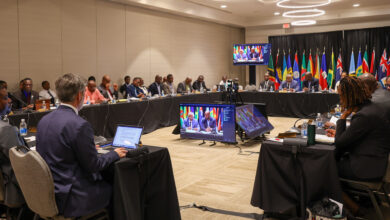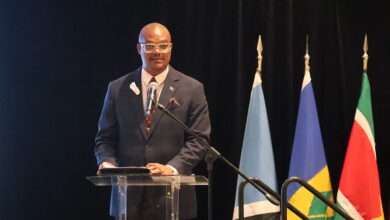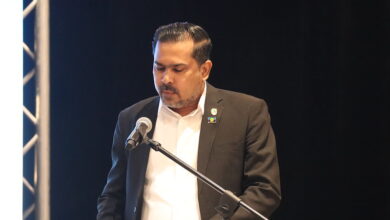Mr. Chairman
Honorable Robert Persaud, Minister of Agriculture of Guyana
Dr Lystra Fletcher-Paul, Food and Agriculture Organization Representative to Guyana
Representatives of International and Regional Organizations and Institutions
Representatives of CARICOM Member States and Associate Members
Representatives from the Dominican Republic
Private Sector Representatives; Ladies and Gentlemen
Good morning and welcome.
On behalf of the Secretary General of the Caribbean Community, His Excellency. Edwin Carrington, I welcome you to this very important workshop on the “Formulation of a Regional Food and Nutrition Security Policy in the Caribbean”, which is being held with support from the FAO Project – Promoting CARICOM/CARIFORUM Food Security, Phase II.
Mr. Chairman, ladies and gentlemen, the right to food is a fundamental human right. It is inhumane for any person to have to suffer the indignity of having to go without regular supplies of the appropriate amount of quality food and nutrients required to sustain a healthy life. I am certain that we all can agree that no nation or region can be truly secure without achieving food and nutrition security. One only has to recall the food riots that took place in some countries as a result of the recent global food crisis. Consequently, we must face head on, the challenges of food and nutrition insecurity both at the national and regional levels.
The fight against hunger and malnutrition has been and continues to be a global challenge. At the Food and Agriculture Organization (FAO) inaugural World Food Summit in 1996, it was estimated that globally over 800 million persons were hungry and malnourished. The goal then, consistent with the Millennium Development Goal targets, was to reduce the number by half by 2015.
Just two weeks ago, 13 years since that Summit, the FAO once again convened another World Summit on Food Security to evaluate progress and develop renewed strategies to tackle hunger, malnutrition and food insecurity, in the wake of the recent food crisis and the current global financial and economic crisis. The FAO now estimates that the number of undernourished people in the world in 2008 is 915 million, and projects that figure to increase to one billion during 2009.
With respect to the Caribbean, the FAO has reported that in 2009 about one in every four persons is undernourished. This is an alarming fact and an indication of the extent of the challenge we face in the Region. While poverty levels have declined in the Region over the years, they remain high in some countries, and in others, there are significant pockets of poverty. Phase I of this project revealed “that food security in the region was compromised not by lack of food availability, per se, but by inadequate access to food and dietary patterns that adversely impact on nutritional status”.
The increases in the prices of agricultural commodities and food items in particular, occasioned by rapidly increasing fuel prices in 2008, has had a negative impact on the accessibility and availability of some major commodities with significant implications for food and nutrition security within the Region.
The increase in the price of fertilizer (a key input to food production), and also increases in freight rates have resulted in an escalation of retail prices to consumers. Furthermore, there has been an increase in demand from the emerging bio-fuels market which is a new and significant source of demand for some agricultural commodities such as sugarcane, maize, cassava, oilseeds and palm oil. The increase in demand for these commodities in bio-fuel production has also been an important factor in the escalation of global food prices.
These matters are of grave concern to CARICOM States and have been receiving attention at the highest political and technical levels. One of the goals of the Community Agricultural Policy, as enshrined in the Revised Treaty of Chaguaramas, is “improved income and employment opportunities, food and nutrition security, and poverty alleviation in the Community”.
Regional efforts to pursue this goal can be traced back to the Regional Transformation Programme for Agriculture, a decision of the Heads of Government in July 1996, and in a more recent dispensation, the Jagdeo Initiative which seeks to remove key binding constraints to production and trade in competitive agricultural commodities. In December 2007, CARICOM Heads of Government met in a special session with a view to finding solutions, at both the national and regional levels, to the critical issue of poverty and the rising cost of living. In July of this year, at the Thirtieth Meeting of the Conference, Heads of Government of the Caribbean Community in the Liliendall Declaration renewed their “commitment to pursue a strategic approach to transforming the agriculture sector into an internationally competitive sector with increased capacity to contribute to the sustained economic development of the Region, the economic livelihood of entrepreneurs, the rural sector and to food and nutrition security”.
In pursuit of the goal of food and nutrition security we need to consider how we can work towards the following:
• reducing the total food import bill through increased regional content in food consumption, increased use of local inputs into feeds and fertilizers, and increasing the productivity of land, labor and capital in the agricultural sector;
• increasing public expenditure in agriculture focused on rural infrastructure, research and development, agricultural health and food safety, and market information systems;
• influencing the taste and preference of our households to consume nutritionally balanced foods as a means of safeguarding against chronic non-communicable diseases which are prevalent in the Region;
• developing agricultural industries buttressed by increased private sector investments and regional production;
• attracting the Youth to becoming agriculture entrepreneurs;
• providing an efficient transportation network across the Region; and
• taking effective action both to mitigate against the effects of climate change and to adapt to its consequences.
The CARICOM Secretariat and the FAO are collaborating as part of FAO’s Special Programme for Regional Food Security, under whose auspices this workshop was developed, with funding by the Government of Italy and the European Commission. After a successful first phase, a second phase was designed to further cement some of the lessons learned in Phase I and to deepen the process of achieving food and nutrition security within the CARIFORUM region. The Secretariat, and hence the Region, is a major beneficiary of this project, as the capacity of our Agricultural Development Unit is being strengthened through the posting of a Food Security Policy Adviser in-house for a period of two years.
In closing, I would like to reiterate the Secretariat’s commitment to coordinating the process of developing a holistic policy position on food and nutrition security for the Community. We consider our coordinating role critical as we strive to assist Member States to meet their commitments under the Rome Declaration on World Food Security as well as the Millennium Development Goals, and most importantly to secure the right of each and every national of the Region to have access to adequate, safe and nutritious food required to sustain a healthy life.
Mr. Chairman, I wish to thank, the Government of Italy for funding both Phases I and II of the Regional project “Promoting CARICOM/CARIFORUM Food Security”. It is also fitting that we thank the FAO for the role it has played and continues to play in the development and implementation of the project. We must also thank all our other international and regional partners who continue to provide support in various forms as we work towards rural development, improved agricultural production and productivity, and achieving food and nutrition security.
Colleagues, as we go through our deliberations over the next two days, be reminded that our task is to produce tangible inputs in the process of developing a holistic policy framework for achieving sustainable food and nutrition security for all in our Region. Remember, time is against us so we must act now.
I wish you all a successful workshop.





